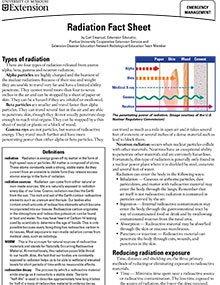

Radiation Fact Sheet
Reviewed
Explains types of radiation—alpha, beta, gamma, neutron—their sources, health effects, and ways to reduce exposure.
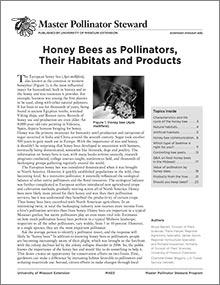
Honey Bees as Pollinators, Their Habitats and Products
New
Learn about the honey bee, from its life cycle, to its various races, to its pest problems, the benefits it provides, and how we can aid its success in this University of Missouri Extension guide. Become a Master Pollinator Steward!
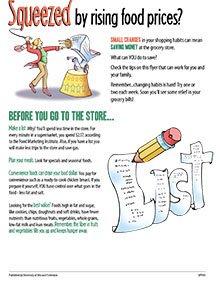
Squeezed by Rising Food Prices?
Reviewed
Small changes in your shopping habits can mean saving money at the grocery store. Check for tips on this page that can work for you and your family.
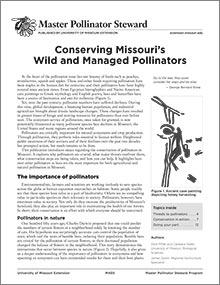
Conserving Missouri's Wild and Managed Pollinators
New
Pollinators are critically important for natural ecosystems and crop production. Learn why pollinators are crucial, the major threats confronting them, conservation steps being taken, and how you can help in this University of Missouri Extension guide.
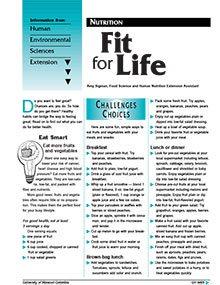
Challenges and Choices: Fit for Life
Reviewed
Practical tips to boost energy and health by adding fruits and vegetables to meals, snacks, and busy lifestyles.

Preserve It Fresh, Preserve It Safe: 2018, No. 4 (July/August)
New
Discover the Seasonal and Simple app, your guide to selecting, preparing, and enjoying fresh, in-season produce with ease.

Collective Bargaining 2: Behavioral Factors Influencing Union Bargaining Power
New
Explore behavioral factors that influence union bargaining power, including solidarity, organizational dynamics, and member engagement strategies.
Collective Bargaining 2: Behavioral Factors Influencing Union Bargaining Power - Page 4
New
Strategic and tactical planning Strategic and tactical planning
One method for taking advantage of both the common and diverse interests of the membership of a local union is to approach bargaining as one aspect of a broader process of stra
Collective Bargaining 2: Behavioral Factors Influencing Union Bargaining Power - Page 2
New
Not all local unions approach the collective bargaining process from the same scope of institutional power, nor should they. Collective bargaining is not a ‘one size fits all’ undertaking. In some cases, a local may be responsible for all aspects of the bargaining process with the international union filling only an advisory, consultative or oversight function.
Collective Bargaining 2: Behavioral Factors Influencing Union Bargaining Power - Page 5
New
Membership support of and involvement in the bargaining process Membership support of and involvement in the bargaining process
Economic security and workplace representation are important goals of the union in the bargaining process.
Collective Bargaining 2: Behavioral Factors Influencing Union Bargaining Power - Page 3
New
Organizational behavior Organizational behavior
When individuals are brought together in any social setting, they may collectively evolve into one of several forms of social organization.
Collective Bargaining 2: Behavioral Factors Influencing Union Bargaining Power - Page 6
New
Building an effective bargaining committee Building an effective bargaining committee
The primary factors for the determination of who will serve on the bargaining committee are the constitution and by-laws of the orga
Tree Pests: Emerald Ash Borer - Page 5
New
All 114 Missouri counties and the city of St. Louis are now under federal and state quarantine to prevent the accidental spread of the borer to states with no reported EAB locations.
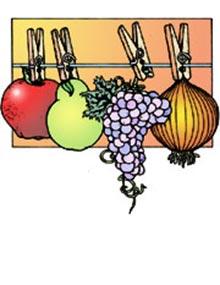
How to Use Dehydrated Foods
Reviewed
Learn how to rehydrate and cook dehydrated fruits and vegetables for use in soups, casseroles, and baked goods.
Tree Pests: Emerald Ash Borer - Page 8
New
EAB management for woodlot owners
Tree Pests: Emerald Ash Borer - Page 11
New
Before you report a possible EAB find
Ask yourself these three questions:
Has EAB been found in my county?
Tree Pests: Emerald Ash Borer - Page 2
New
Learn to identify emerald ash borer infestations through signs like D-shaped holes, S-shaped larval galleries, bark splits, and crown dieback.
Tree Pests: Emerald Ash Borer - Page 6
New
EAB management for homeowners
If you have ash trees, learn more about EAB before you act. The potential threat of EAB is real, but acting without understanding the specific threat to your trees, regulations, quarantines and your options could cause the unnecessary loss of treasured shade trees.
Tree Pests: Emerald Ash Borer - Page 9
New
Learn how to manage the Emerald Ash Borer, a damaging pest to ash trees, including control methods and movement restrictions to prevent spread.
Tree Pests: Emerald Ash Borer - Page 3
New
Where EAB has been found
EAB has spread significantly since its original detection in the Detroit area back in 2002, and as one can see from this map, there are still a lot of vulnerable locations across the United States.
Tree Pests: Emerald Ash Borer - Page 4
New
Track EAB activity for 2020
Statewide for 2020, EAB activity is now declining. However, symptoms such as bark flecking and epicormic sprouting will continue to show up on infested trees.
Tree Pests: Emerald Ash Borer - Page 7
New
EAB management for cities and towns
Tree Pests: Emerald Ash Borer - Page 10
New
Slow the spread of EAB
Even though the entire state of Missouri is now under federal quarantine and it is legal to move ash products and hardwood firewood among counties within the state, the Missouri Invasive Forest Pest Council URGES everyone to follow the following steps to protect from the spread of EAB:
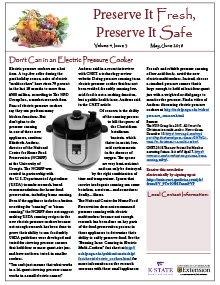
Preserve It Fresh, Preserve It Safe: 2018, No. 3 (May/June)
New
Try this Pickled Three-Bean Salad recipe, spring clean your freezer, preserve homemade pesto, and learn why not to can with an electric pressure cooker, all in this University of Missouri Extension newsletter for home food preservers.
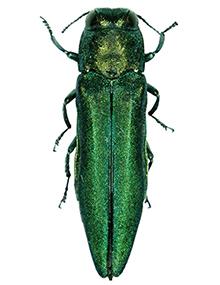
Tree Pests: Emerald Ash Borer
New
Emerald ash borer is an invasive, wood-boring insect that infests and kills ash trees. Learn the signs, symptoms and management and how to slow the spread.